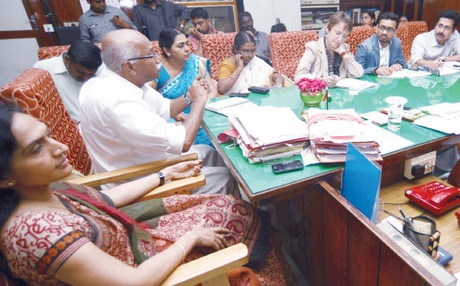- Forum
- categories
- Markets, finance and governance
- Cities (planning, implementation, and management processes)
- City Sanitation Plans (CSP) in India (old title DEWATS in India)
City Sanitation Plans (CSP) in India (old title DEWATS in India)
22.8k views
- AnanyaGh
-

- Shit-talks interests me most as I possess the Learner's brain
Less- Posts: 26
- Likes received: 6
Re: City Sanitation Plans (CSP) in India (old title DEWATS in India)
Hi Cecilia,
Thanks a ton for sharing the documents. Each of them are pretty comprehensive and I enjoyed going through each one of them. Great job!
All best wishes,
Regards,
Ananya
Thanks a ton for sharing the documents. Each of them are pretty comprehensive and I enjoyed going through each one of them. Great job!
All best wishes,
Regards,
Ananya
Wash-in-Schools
'Learner'

'Learner'
Please Log in to join the conversation.
You need to login to replyRe: City Sanitation Plans (CSP) in India (old title DEWATS in India)
Hello everyone,
@Kiku, thank you for your comment. I am sure there is a lot to learn with the experience of GIZ India regarding the preparation of CSPs.
@Ananya, the project in Kochi is still a work in progress, as part of the same program of GIZ India, already mentioned in this thread by my colleagues Moritz and Christian. You can have a look at the city sanitation plan of Kochi, available in the SuSanA library (as well as Nashik, Raipur, Shimla, Tirupati): www.susana.org/lang-en/library?view=ccbktypeitem&type=2&id=1582
@Leon, I supposed you already finished your work by now. Anyways, since the elaboration of the NUSP, around 150 cities out of 7600 (roughly) developed their CSPs, mainly with the support of consultants, and around 10 states out of 28 developed their State Sanitation Strategy, as prescribed by the policy document. It seems a small progress and I can't tell you yet the influence of the document on the ground, simply put, how they contributed to the improvement of living condition of the population, specially the poorest sectors. Nevertheless, the recognition of a federal government in a country with the dimensions of India already signalizes the recognition of the issue and brings sanitation a bit higher in the agenda. It also moves one step forward towards the realization of sanitation as a human right. Many other steps in between are still to developed, strengthened, but then we can leave it to a next post... Btw, could you send us your work? I would be curious to read it! Here is a factsheet that explains a bit the NUSP and the GIZ program here: www.susana.org/lang-en/library?view=ccbktypeitem&type=2&id=1584
All the best,
Cecilia.
@Kiku, thank you for your comment. I am sure there is a lot to learn with the experience of GIZ India regarding the preparation of CSPs.
@Ananya, the project in Kochi is still a work in progress, as part of the same program of GIZ India, already mentioned in this thread by my colleagues Moritz and Christian. You can have a look at the city sanitation plan of Kochi, available in the SuSanA library (as well as Nashik, Raipur, Shimla, Tirupati): www.susana.org/lang-en/library?view=ccbktypeitem&type=2&id=1582
@Leon, I supposed you already finished your work by now. Anyways, since the elaboration of the NUSP, around 150 cities out of 7600 (roughly) developed their CSPs, mainly with the support of consultants, and around 10 states out of 28 developed their State Sanitation Strategy, as prescribed by the policy document. It seems a small progress and I can't tell you yet the influence of the document on the ground, simply put, how they contributed to the improvement of living condition of the population, specially the poorest sectors. Nevertheless, the recognition of a federal government in a country with the dimensions of India already signalizes the recognition of the issue and brings sanitation a bit higher in the agenda. It also moves one step forward towards the realization of sanitation as a human right. Many other steps in between are still to developed, strengthened, but then we can leave it to a next post... Btw, could you send us your work? I would be curious to read it! Here is a factsheet that explains a bit the NUSP and the GIZ program here: www.susana.org/lang-en/library?view=ccbktypeitem&type=2&id=1584
All the best,
Cecilia.
Programme Officer at GIZ - Sustainable Sanitation Programme
and the SuSanA Secretariat
and the SuSanA Secretariat
The following user(s) like this post: Moritz
Please Log in to join the conversation.
You need to login to reply- Kiku
-

- Water and Sanitation Specialist
Less- Posts: 38
- Karma: 6
- Likes received: 18
Re: City Sanitation Plans (CSP) in India (old title DEWATS in India)
Hi, quite an old post but extremely relevant. City/Town Sanitation Plans definitely present an opportunity for implementing at scale as we move away from a cycle of pilots. The GIZ water program in Uganda will keenly follow developments in India as our future work will follow a similar approach. What we are looking at initially is development and implementation of sanitation plans at "small town" level. The terminology is relevant as towns with 5,000 to 25,000 inhabitants come with different opportunities and challenges compared to cities with 1 million-plus inhabitants.
The issues in developing and emerging economies are similar. From unclear policy and institutional environments to lack of robust/innovative funding mechanisms to governance issues, I foresee similar challenges to what colleagues in India are facing. Nonetheless, planning is always a step in the right direction.
Best,
Fredrick
The issues in developing and emerging economies are similar. From unclear policy and institutional environments to lack of robust/innovative funding mechanisms to governance issues, I foresee similar challenges to what colleagues in India are facing. Nonetheless, planning is always a step in the right direction.
Best,
Fredrick
Fredrick Tumusiime, MSc
Skype: tufre80
Skype: tufre80
The following user(s) like this post: AnanyaGh
Please Log in to join the conversation.
You need to login to reply- AnanyaGh
-

- Shit-talks interests me most as I possess the Learner's brain
Less- Posts: 26
- Likes received: 6
Re: City Sanitation Plans (CSP) in India (old title DEWATS in India)
Hi,
This is great initiative. Can we have more details about the program and its implementation? It will be a great help if more information on this is shared.
Thanks,
Ananya
This is great initiative. Can we have more details about the program and its implementation? It will be a great help if more information on this is shared.
Thanks,
Ananya
Wash-in-Schools
'Learner'

'Learner'
Please Log in to join the conversation.
You need to login to replyRe: City Sanitation Plans (CSP) in India (old title DEWATS in India)
Hi everybody, check out this article about The Kochi Corporation, who is looking into the possibilities of introducing a decentralised system for better sanitation in the city.
See if you can spot Co-Lead of WG6 Rahul in the picture.
newindianexpress.com/cities/kochi/Decent...41.ece#tabs-275876-1
Posted by a member of the SuSanA secretariat held by the GIZ Sector Program Water Policy – Innovations for Resilience
Located at Deutsche Gesellschaft für Internationale Zusammenarbeit (GIZ) GmbH, Bonn, Germany
Follow us on facebook: www.facebook.com/susana.org, linkedin: www.linkedin.com/company/sustainable-sanitation-alliance-susana.
Located at Deutsche Gesellschaft für Internationale Zusammenarbeit (GIZ) GmbH, Bonn, Germany
Follow us on facebook: www.facebook.com/susana.org, linkedin: www.linkedin.com/company/sustainable-sanitation-alliance-susana.
Attachments:
-
 Senior-Adv...Dube.jpg
(Filesize: 75KB)
Senior-Adv...Dube.jpg
(Filesize: 75KB)
The following user(s) like this post: Moritz
Please Log in to join the conversation.
You need to login to reply- leon
-
Less
- Posts: 6
- Likes received: 0
Re: The National Urban Sanitation Policy (NUSP) 2008 in India
[This is page 2 of the discussion thread]
I'm unsure reagarding the importance of the NUSP. What changed with its launch in 2008 in Indias sanitation policy and what's its significance?
I hope somebody can help me.
Kind Regards
Leon
I'm unsure reagarding the importance of the NUSP. What changed with its launch in 2008 in Indias sanitation policy and what's its significance?
I hope somebody can help me.
Kind Regards
Leon
Please Log in to join the conversation.
You need to login to reply- leon
-
Less
- Posts: 6
- Likes received: 0
Re: City Sanitation Plans (CSP) in India (old title DEWATS in India)
Hey all,
I think that I have now enough informations about the CSP from Raipur for my A-level work and in addition I could contact Moritz who could help me a lot too. (Thank you Moritz).
What I haven't done so far, is to get in touch with a person which takes part in the CSP of Raipur.
If there is somebody who currently works or has worked at the CSP in Raipur, I would be interested in his opinion and his thoughts about the CSP.
Kind Regards
Leon
I think that I have now enough informations about the CSP from Raipur for my A-level work and in addition I could contact Moritz who could help me a lot too. (Thank you Moritz).
What I haven't done so far, is to get in touch with a person which takes part in the CSP of Raipur.
If there is somebody who currently works or has worked at the CSP in Raipur, I would be interested in his opinion and his thoughts about the CSP.
Kind Regards
Leon
Please Log in to join the conversation.
You need to login to reply- ndivine
-
Less
- Posts: 17
- Likes received: 1
Re: City Sanitation Plans (CSP) in India (old title DEWATS in India)
Hi Moritz, All,
this is so encouraging and after watching CNN last couple of nights ago , it was mentioned Child Labour has been autorized in India . That said , many of these kids were laboured and lot of politics setbacks though but SANITATION was not taken care of meaning it is a point to address.
In cohesion with the main point of discussion , I equally feel that CDD India can use Sanitation as a tool to reinforce youth capacity building because with out Water , Clean Environment as a whole nothing can be possible because :
-it shall cause a lot of diseases and increase death rate
-at a global level the work force shall drastically drop as well.
So this comes in a sense of recommendation , we at SuSanA , have the potentials and tools to ensure for a Sustainable Future due to our main goal and objectives .
Once more keep doing the good job .
Regards,
Divine
this is so encouraging and after watching CNN last couple of nights ago , it was mentioned Child Labour has been autorized in India . That said , many of these kids were laboured and lot of politics setbacks though but SANITATION was not taken care of meaning it is a point to address.
In cohesion with the main point of discussion , I equally feel that CDD India can use Sanitation as a tool to reinforce youth capacity building because with out Water , Clean Environment as a whole nothing can be possible because :
-it shall cause a lot of diseases and increase death rate
-at a global level the work force shall drastically drop as well.
So this comes in a sense of recommendation , we at SuSanA , have the potentials and tools to ensure for a Sustainable Future due to our main goal and objectives .
Once more keep doing the good job .
Regards,
Divine
Please Log in to join the conversation.
You need to login to reply- Moritz
-
 Topic AuthorLess
Topic AuthorLess- Posts: 43
- Karma: 5
- Likes received: 21
Dear all,
Thank you for your comments and sorry for the delay of my response.
@Rahul: You are right, the vast population growth in Raipur is mainly due to the fact that it became the state capital of Chhattisgarh.
@Leon: Thank for your well informed enquiry. As Elisabeth already mentioned, it is impressive how much effort you invest in your work. Good on you.
I am more than happy to explain you the history and future of the CSP in Raipur and the subsequent documents. However in such complex systems questions mostly do not have quick and easy answers. I had to deal with most of your questions recently. Please contact me directly at moritz dot gold at giz dot de. I will find out which documents I can share with you. The status of the sanitation and sanitation-related facilities (like solid waste infrastructure) are part of the CSP documents.
For me the most important point is the difference between the development of the CSP documents and the succeeding implementation. As Christian already mentioned the development and the implementation of CSPs is at the end depending on the local political bodies. India has an incredible complex, bureaucratic and often inefficient political system with a countless number of ministries and departments on national, state and city level. Corruption is also playing a big role. Even if cities agree on the implementation of sanitation infrastructure, it could still be blocked by the state level due to political strategies/charades of the different political parties. Municipal Cooperation’s such as Raipur are often understaffed and underlie high fluctuations. Therefore the best CSP is not a guarantee for the development of sanitation infrastructure. In Raipur for example main stakeholders have not studied the CSP documents. GIZ has so called Environmental Cells (one person) within the Municipal Cooperation’s of the CSP cities. They generally have their offices within the municipal cooperation and deal with the ground reality and are essential for both the preparation and implementation of CSPs.
The CSP of Raipur prepared by local partners (Alchemy Bangalore, CDD Bangalore, CEPT Ahmedabad, CARDS Raipur) under supervision of GIZ was handed over to the city of Raipur. As mentioned above, GIZ together with the local partner Consortium for DEWATS Dissemination Society (www.cddindia.org) is preparing a Detailed Project Report for a decentralized treatment facility as a kick-off of the CSP implementation. In Raipur, this project is in the vicinity of urban waterbodies and should be a pilot for similar boundary conditions (Raipur has more than 50 urban waterbodies). However in the end (the handing over of the DPR), the implementation of the pilot lies in the hands of the Raipur Municipal Cooperation. I am not familiar with all steps taken by the Raipur Municipal Cooperation towards the implementation of the CSP.
@all: The data collection of the pilot project in Raipur made some good process recently. In the middle of June a household survey to identify the mode of water supply and the subsequent consumption, solid waste disposal mechanisms, sanitation facilities and the use of septic tanks was accomplished for the catchment with approximately 750 people. Residents were incredibly cooperative during the survey.
The urban waterbody and drains of interest were sampled for major biochemical and microbilogical parameters. Moreover weirs were used to identify the discharge of untreated wastewater entering and bypassing the lake. A main problem while sampling and measuring of the discharge was the abundance of solid waste which most likely affected the accuracy of the results.
After their evaluation this results will be summarized in a status report and form the basis for the development of an adapted decentralized wastewater treatment concept in the vicinity urban waterbodies.
Greetings Moritz
Thank you for your comments and sorry for the delay of my response.
@Rahul: You are right, the vast population growth in Raipur is mainly due to the fact that it became the state capital of Chhattisgarh.
@Leon: Thank for your well informed enquiry. As Elisabeth already mentioned, it is impressive how much effort you invest in your work. Good on you.
I am more than happy to explain you the history and future of the CSP in Raipur and the subsequent documents. However in such complex systems questions mostly do not have quick and easy answers. I had to deal with most of your questions recently. Please contact me directly at moritz dot gold at giz dot de. I will find out which documents I can share with you. The status of the sanitation and sanitation-related facilities (like solid waste infrastructure) are part of the CSP documents.
For me the most important point is the difference between the development of the CSP documents and the succeeding implementation. As Christian already mentioned the development and the implementation of CSPs is at the end depending on the local political bodies. India has an incredible complex, bureaucratic and often inefficient political system with a countless number of ministries and departments on national, state and city level. Corruption is also playing a big role. Even if cities agree on the implementation of sanitation infrastructure, it could still be blocked by the state level due to political strategies/charades of the different political parties. Municipal Cooperation’s such as Raipur are often understaffed and underlie high fluctuations. Therefore the best CSP is not a guarantee for the development of sanitation infrastructure. In Raipur for example main stakeholders have not studied the CSP documents. GIZ has so called Environmental Cells (one person) within the Municipal Cooperation’s of the CSP cities. They generally have their offices within the municipal cooperation and deal with the ground reality and are essential for both the preparation and implementation of CSPs.
The CSP of Raipur prepared by local partners (Alchemy Bangalore, CDD Bangalore, CEPT Ahmedabad, CARDS Raipur) under supervision of GIZ was handed over to the city of Raipur. As mentioned above, GIZ together with the local partner Consortium for DEWATS Dissemination Society (www.cddindia.org) is preparing a Detailed Project Report for a decentralized treatment facility as a kick-off of the CSP implementation. In Raipur, this project is in the vicinity of urban waterbodies and should be a pilot for similar boundary conditions (Raipur has more than 50 urban waterbodies). However in the end (the handing over of the DPR), the implementation of the pilot lies in the hands of the Raipur Municipal Cooperation. I am not familiar with all steps taken by the Raipur Municipal Cooperation towards the implementation of the CSP.
@all: The data collection of the pilot project in Raipur made some good process recently. In the middle of June a household survey to identify the mode of water supply and the subsequent consumption, solid waste disposal mechanisms, sanitation facilities and the use of septic tanks was accomplished for the catchment with approximately 750 people. Residents were incredibly cooperative during the survey.
The urban waterbody and drains of interest were sampled for major biochemical and microbilogical parameters. Moreover weirs were used to identify the discharge of untreated wastewater entering and bypassing the lake. A main problem while sampling and measuring of the discharge was the abundance of solid waste which most likely affected the accuracy of the results.
After their evaluation this results will be summarized in a status report and form the basis for the development of an adapted decentralized wastewater treatment concept in the vicinity urban waterbodies.
Greetings Moritz
Moritz Gold
PhD student ETH Zurich & Eawag/Sandec
PhD student ETH Zurich & Eawag/Sandec
Please Log in to join the conversation.
You need to login to reply- leon
-
Less
- Posts: 6
- Likes received: 0
Re: Question about the CSP for Raipur and search for a report about sanitation of urban poor in India
Dear Elisabeth,
Yes, I've seen the answer from Christian Vosseler. I'm sorry that I've not mentioned his posting, I've not yet much experience concerning forums and how to act in these communities.
Thanks for the compliment
Kind regards
Leon
Yes, I've seen the answer from Christian Vosseler. I'm sorry that I've not mentioned his posting, I've not yet much experience concerning forums and how to act in these communities.
Thanks for the compliment
Kind regards
Leon
Please Log in to join the conversation.
You need to login to reply- Elisabeth
-
- User is blocked
- Freelance consultant since 2012
Less- Posts: 3372
- Karma: 54
- Likes received: 932
Re: Question about the CSP for Raipur and search for a report about sanitation of urban poor in India
Dear Leon,
In my role as moderator: I have moved your posting so that instead of being a new topic, it follows on from your previous postings on the same topic (which is always better). Did you see the answers which Christian Vosseler from GIZ India had written to you earlier (please scrol up)? I am just asking because you are not referring to his posting in your new posting. Let's see if he or someone else can give you information about Raipur.
Wow, I am impressed how deeply you are getting into this topic even though it is only your A-level at high school! Is that normal? Well done! What will you study afterwards?
Regards,
Elisabeth
In my role as moderator: I have moved your posting so that instead of being a new topic, it follows on from your previous postings on the same topic (which is always better). Did you see the answers which Christian Vosseler from GIZ India had written to you earlier (please scrol up)? I am just asking because you are not referring to his posting in your new posting. Let's see if he or someone else can give you information about Raipur.
Wow, I am impressed how deeply you are getting into this topic even though it is only your A-level at high school! Is that normal? Well done! What will you study afterwards?
Regards,
Elisabeth
Dr. Elisabeth von Muench
Freelance consultant on environmental and climate projects
Freelance consultant on environmental and climate projects
Please Log in to join the conversation.
You need to login to reply- christian.rieck
-

- Moderator
Less- Posts: 118
- Karma: 7
- Likes received: 41
Re: Question about the CSP for Raipur and search for a report about sanitation of urban poor in India
Dear Leon,
I know that my GIZ colleagues work on City Sanitation Plans as well as GIZ International Services. You can find some useful information on www.indiawaterportal.org/taxonomy/term/7720 . I do not have any contacts at the moment, but just contacted somebody about it.
Cheers
Christian
I know that my GIZ colleagues work on City Sanitation Plans as well as GIZ International Services. You can find some useful information on www.indiawaterportal.org/taxonomy/term/7720 . I do not have any contacts at the moment, but just contacted somebody about it.
Cheers
Christian
GIZ Uganda
Enhanced Water Security and Sanitation (ENWASS)
Sanitation for Millions
This email address is being protected from spambots. You need JavaScript enabled to view it.
Enhanced Water Security and Sanitation (ENWASS)
Sanitation for Millions
This email address is being protected from spambots. You need JavaScript enabled to view it.
Please Log in to join the conversation.
You need to login to reply
Share this thread:
- Forum
- categories
- Markets, finance and governance
- Cities (planning, implementation, and management processes)
- City Sanitation Plans (CSP) in India (old title DEWATS in India)
Recently active users. Who else has been active?
Time to create page: 0.184 seconds







